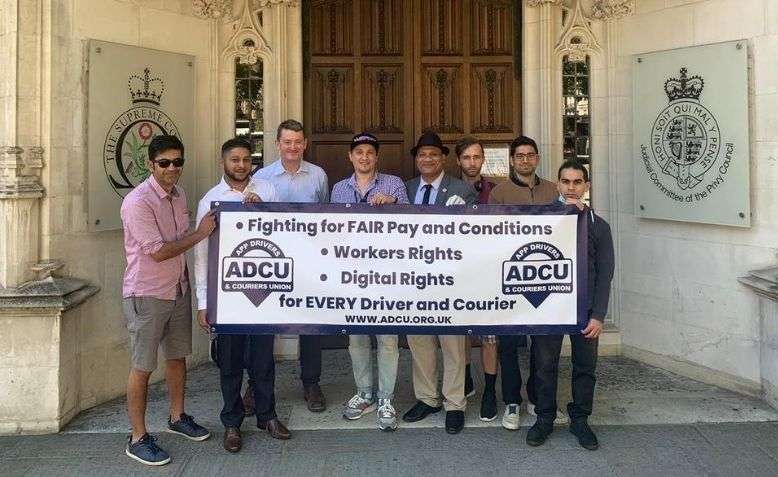 ADCU Members outside the Supreme Court on 20th July 2020. Photo: ADC Union / Cropped original image / licensed under CC 4.0, links at bottom of article
ADCU Members outside the Supreme Court on 20th July 2020. Photo: ADC Union / Cropped original image / licensed under CC 4.0, links at bottom of article
Uber drivers represent a key struggle for gig economy workers, writes Neda Radulovic-Viswanatha
On 13 July, Trades Union Certification Officer entered the App Drivers and Couriers Union (ADCU) on the list of Britain’s trade unions. ADCU was set up to serve the needs of private hire drivers and couriers whose work is digitally mediated. But the country’s newest trade union has no lack of experience. Its founders have a track record of helping drivers since 2013 and, under the banner of United Private Hire Drivers (UPHD), they won a landmark 2016 employment status claim against Uber, and organized the first coordinated national strike against Uber in 2018. Uber is appealing the 2016 decision once more at the UK Supreme Court with a final ruling expected in September. Should Uber succeed in its appeal, this would effectively mean the end of the right to organise for millions of gig economy workers.
One of the union’s objectives is “to promote greater international cooperation and solidarity with fellow app transport workers and other workers recognising the global reach of common platforms of app employers”. It is therefore not surprising that the ADCU founders and National Executive members initiated the formation of the International Alliance of App-Based Transport Workers (IAATW). Drivers from 27 different countries met in Oxford in January this year for the first-ever convening of app-based transport workers.
While Uber is finding novel ways to extract profit during the pandemic, e.g. through the newly announced replacement of a fixed base fare with a variable base fare and the resulting estimated earnings as low as £1 or £2 per ride, the union is finding novel ways to unite the workers internationally and hit the employer where it hurts most. This time, supported by the IAATW and Worker Info Exchange, they are launching legal action against Uber at the district court in Amsterdam, where Uber’s EMEA headquarters are located. Union’s collective action campaign calls on all Uber drivers and Uber Eats couriers based in the UK and the EEA to join in the request for Uber to provide full access to their data under the GDPR and to make algorithmic management transparent.
Against the secrecy and control of the premier app-based transportation company, which includes alleged performance profiling and rating of its drivers and couriers using electronic tags such as ‘negative attitude’, workers are showing what a positive, transparent, collective, and international effort to fight for our rights looks like. Falling outside of the scope of the traditional labour laws and established unions’ structures is as much an opportunity as it is a challenge. We can show our solidarity by supporting their CrowdJustice campaign here.
Join Revolution! May Day weekender in London
The world is changing fast. From tariffs and trade wars to the continuing genocide in Gaza to Starmer’s austerity 2.0.
Revolution! on Saturday 3 – Sunday 4 May brings together leading activists and authors to discuss the key questions of the moment and chart a strategy for the left.

